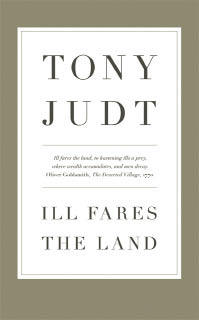Tony Judt is a vivacious and controversial historian. He is Jewish but has turned against Israel. He is a thinker of the Left who has ended up in the USA. And now he has been struck down with a grievous illness, a virulent form of motor neurone disease which has left him paralysed from the neck down. As a result he has composed his latest book in his head and then dictated it to an aide, using the classic memory device of setting the text in different rooms of an elaborate building. This elegant essay is the result.
Judt’s illness has left him determined to restate his belief in what he calls social democracy. It is above all aimed at the younger generation. He fears that, because of the dominance of neo-liberalism, they have lost an appreciation of the good that the state can do.
This book is rather like a modern version of T. H. Marshall’s classic 1950 essay, ‘Citizenship and Social Class’. It is an attempt to mount a sustained argument about the pattern of human progress in which the state is a key agent for the expansion of prosperity and freedom. But this Whiggish narrative of human progress is interrupted by the rise of Thatcher and Reagan: it is their doctrines which he hopes to defeat.
I do not believe he quite carries it off. Oddly enough for a historian, it is his historical narrative which lets him down at two key points. His first mistake is his account of post-war Keynesianism. He regards this as an expansion of the role of the state compared with the pre-war period and the source of our post-war surge in prosperity and employment. This is ironically a caricature he shares with some Thatcherites who dismiss the entire period from 1945 to 1979 as pinko socialism. Robert Skidelsky’s magisterial work has demolished this picture of Keynesianism. Instead we should see Keynes as reversing the intrusive micro-economic corporatism of the inter-war years. What Keynes showed was that Government could take responsibility for managing the macro-economy without getting into micro-economic controls. The desperate resort to prices and incomes controls in the 1960s and 1970s was a break with his original model.
Monetarists and Keynesians share an aversion to this micro-economic interference by the state. The difference between them is that monetarists believe that power lies with monetary policy and Keynesians believe fiscal deficits can be the stimulus. But they agree that governments have a responsibility for macro-economic management; Friedman famously showed that the Great Depression was a result of the contraction of the money supply, an appalling public policy failure. All this matters today, with both Tories and Labour accepting a role for Government for getting us out of the recession but with Labour focussing on the supposed stimulus of Budget deficits and Tories arguing for the importance of holding down interest rates and the threat to this from high deficits. This argument does not really fit in to Judt’s model.
This reinterpretation of Keynes matters because it challenges his Whiggish picture of the state driving progress until it was rudely interrupted on both sides of the Atlantic by Thatcher and Reagan. The second problem with Judt’s historical narrative is that he cannot quite take the revival of the Centre Right under Thatcher and Reagan as a serious historical event. Instead he thinks it has just been a terrible mistake — as if our sat nav has let us down and we have ended up stuck on a cart track and he just wants to be back on the motorway of progress.
He does not recognise that suspicion of the effectiveness of state activity is deep-seated and entirely understandable given the evidence of state failure. Whatever the outcome of the next election we are coming to the end of a decade-long experiment with increased public spending here. The Office of National Statistics has shown that big increases in public spending have been matched by big falls in public sector productivity. The Government has failed to reform the supply of public services and so much of the extra spending has gone on higher costs.
There will be a role for the state in the 21st century. We are not going to be heading for the hills of Montana in some kind of libertarian experiment. I myself believe that it is one of the most important ways in which we discharge our obligation to future generations — we cannot do it all through the family. But post-war experience has surely taught us that, as well as market failure, there is also the problem of state failure.
We must just hope that Tony Judt is able to continue putting an alternative point of view as an eloquent voice of the social democratic conscience.
David Willetts’s book, The Pinch: How the Baby Boomers took their Children’s Future and Why They Should Give it Back, is published by Atlantic.






Comments